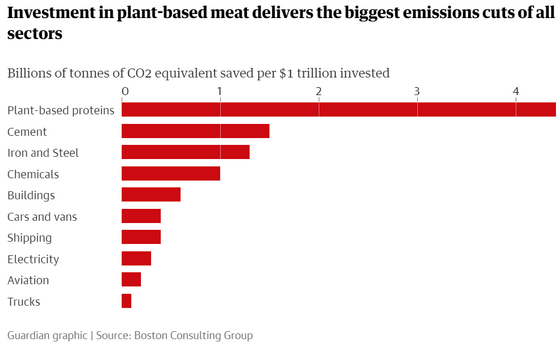Reported that the best climate change countermeasure is 'plant-derived meat', investment efficiency is 11 times that of zero-emission vehicles

Many people think of 'investment in global warming countermeasures' as technologies related to the development of renewable energy such as solar panels and wind power generation, and cutting-edge technologies such as fusion power generation that does not emit carbon dioxide. A newly released research report shows that investing in meat substitutes produced without animal-derived materials is overwhelmingly more effective than investing in technology in other areas. rice field.
Food for Thought: The Untapped Climate Opportunity in Alternative Proteins | BCG
Plant-based meat by far the best climate investment, report finds | Food | The Guardian
https://www.theguardian.com/environment/2022/jul/07/plant-based-meat-by-far-the-best-climate-investment-report-finds
Plant-based meat by far the best climate investment, report finds
https://www.tech-paper.com/2022/07/plant-based-meat-by-far-best-climate.html
Since meat production generates a large amount of greenhouse gases such as carbon dioxide and methane, it is said that by switching livestock meat to meat substitutes, carbon dioxide emissions can be reduced by 80%, raising environmental awareness. In response, Burger King and McDonald's are launching products using plant-derived meat one after another.
Switching meat to cultured or synthetic meat can reduce carbon dioxide emissions by 80% --GIGAZINE

In a report released on July 8, 2022, consulting firm Boston Consulting Group (BCG) recycles greenhouse gas savings per dollar invested in these meat and dairy alternatives. It is reported that it will reach 3 times as much as the green cement technology for making cement from industrial waste, 7 times as much as the green building constructed with energy saving in mind, and 11 times as much as the zero emission car such as EV car.

This difference stems from the large differences in greenhouse gas emissions between traditional meat and dairy production and plant growth. For example, beef emits 6 to 30 times more greenhouse gases than tofu.
In this regard, BCG Partner and Associate Director Malte Clausen said, 'We call alternative proteins' untapped climate opportunities'. Despite their rapid development, electric vehicles and It's because there are no investments like wind power and solar panels. For investors who are concerned about the impact of their investment, this area is definitely a must. '
Meat substitutes are favored not only by manufacturers and investors, but also by consumers. According to BCG, spending on alternative proteins, including meat made from fermented foods and cultured cells, will increase from $ 1 billion in 2019 to $ 5 billion in 2021. It is estimated that it has increased to (yen). In addition, the ratio of alternative products to total protein consumption is estimated to grow from 2% in 2020 to 11% by 2035, reaching 22% with the support of regulators and investors. It is expected.

In addition, the term ' flight shame ' has been coined to refrain from using airplanes due to heightened environmental awareness, but climate change measures such as reducing the use of airplanes and renovating houses to be environmentally friendly are important for people's lives and households. It will be a burden. Compared to these solutions, switching to alternative proteins is also characterized by fewer economic trade-offs, BCG pointed out. In fact, 30% of consumers who are incorporating alternative proteins into their table say that 'the main reason is that they are positive for climate change.'
'The switch to plant-derived meat also helps mitigate the food crisis. Humans eat the crops directly, which leads to the elimination of so-called'intermediaries' such as cows, pigs and chickens,' said Clausen. Because it requires less crops. '
Related Posts:







